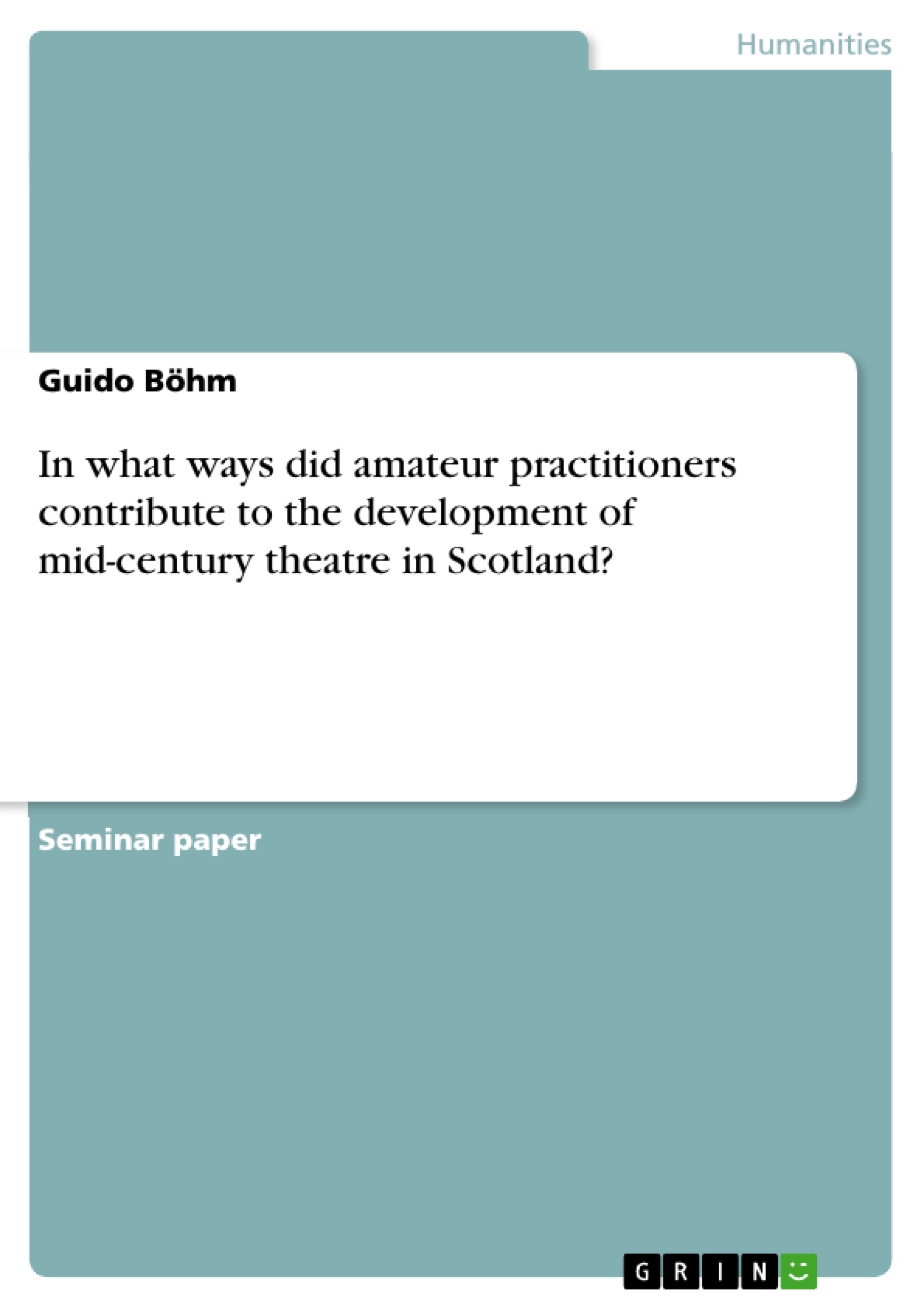What nowadays is known as “Scottish National Theatre” did not exist one hundred years ago. Though there were a high number of theatres in Scotland at this time, the programs performed on their stages were entirely dominated by English companies, English actors, English playwrights and directors. In general they were dominated by “English Theatre” in the broadest sense. Even “traditionally Scottish topics”, such like Rob Roy, The Lady of the Lake and the like were performed on stage as if one would present a kind of a tourist attraction. The Scots could by far not find their history presented, as they understood it in these productions, for they were again London-based. However, through the economical situation in Scotland at that time and the complete lack of a dramatic tradition (like there has been one in England for several centuries), it was nearly impossible for emerging Scottish Playwrights and Companies to establish themselves. That hopeless situation changed in the first decades of the 20th century. Scotland felt a strong need for an independent, national identity and this should affect the theatre as well. Ambitions to follow the example of Ireland and to become theatrically independent lead to a serious effort in creating a national theatre. An important role in the formation of the lively Scottish theatre scene one can find today played the activity of amateur theatre, which was established by working-class communities. An amateur theatre movement had risen in Britain during the second half of the 19th century and it strongly influenced the industrial parts of Scotland (namely Glasgow) in the 1920s, 30s and 40s.
Inhaltsverzeichnis (Table of Contents)
- Introduction
- The Scene
- The Scottish National Players
- Glasgow Unity Theatre 1941-1951
- Conclusion
Zielsetzung und Themenschwerpunkte (Objectives and Key Themes)
This essay explores the role of amateur theatre practitioners in the development of mid-century Scottish theatre. It examines the rise of amateur theatre in Scotland, particularly in Glasgow, and its impact on the creation of a national drama tradition.
- The rise of amateur theatre in Scotland in the 1920s and 1930s
- The significance of amateur theatre in fostering a national identity
- The role of amateur theatre in promoting social awareness and political activism
- The influence of amateur theatre on the development of professional Scottish theatre
- The impact of amateur theatre on the development of “Scottish popular drama”
Zusammenfassung der Kapitel (Chapter Summaries)
The essay begins by outlining the historical context of Scottish theatre in the late nineteenth and early twentieth centuries, highlighting the dominance of English theatre companies and the absence of a distinct Scottish dramatic tradition. The introduction establishes the importance of amateur theatre in the emergence of a national theatre scene in Scotland.
The chapter titled "The Scene" focuses on the growth of amateur theatre in Scotland, particularly the role of the Scottish Community Drama Association (SCDA) in promoting and supporting amateur companies. The chapter also discusses the socio-political context of the time, specifically the rise of socialism and working-class activism in Glasgow, which contributed to the popularity and significance of amateur theatre.
The chapter on the “Scottish National Players” examines the origins and activities of this prominent amateur company. It details their commitment to developing Scottish national drama through productions featuring Scottish themes and characters, and their efforts to tour throughout Scotland to reach a wider audience.
Schlüsselwörter (Keywords)
This essay focuses on the development of mid-century Scottish theatre, specifically the role of amateur theatre in shaping a national drama tradition. Key concepts include the emergence of “Scottish popular drama”, the influence of working-class communities, the importance of social and political themes in amateur productions, and the contributions of prominent amateur companies like the Scottish National Players and Glasgow Unity.
Frequently Asked Questions
Why was there no distinct Scottish National Theatre 100 years ago?
At that time, the Scottish stage was dominated by English companies, actors, and playwrights, with Scottish topics often presented as mere tourist attractions from a London perspective.
How did amateur practitioners contribute to Scottish theatre?
Amateur theatre, often established by working-class communities, played a crucial role in creating an independent national identity and fostering a local dramatic tradition.
What was the significance of the Glasgow Unity Theatre?
Active between 1941 and 1951, it promoted social awareness and political activism, becoming a cornerstone of "Scottish popular drama."
What role did the Scottish National Players play?
They were a prominent amateur company committed to developing national drama by touring Scotland and focusing on authentic Scottish themes and characters.
How did the socio-political context of the 1920s-40s affect Scottish theatre?
The rise of socialism and working-class activism, especially in Glasgow, fueled the amateur theatre movement, making it a platform for national and social expression.
- Arbeit zitieren
- Guido Böhm (Autor:in), 2001, In what ways did amateur practitioners contribute to the development of mid-century theatre in Scotland?, München, GRIN Verlag, https://www.hausarbeiten.de/document/64807


